Why Deep Seek should be your go-to A.I.
This essay will cover technological and home country comparisons between the A.I. options of Deep Seek, ChatGPT and Gemini. ChatGPT and Gemini are based in the US, while Deep Seek is based in China.
9/22/202413 min read


Why Deep Seek should be your go to A.I
Overview
This essay will cover technological and home country comparisons between the A.I. options of Deep Seek, ChatGPT and Gemini. ChatGPT and Gemini are based in the US, while Deep Seek is based in China.
Methodology
I will use critically vetted sources, links and my own analysis in my professional capacity as a strategist. We will analyze state state and non-state entities, specifically how they allocate resources. Resource allocation is important because it pierces through rhetoric and propaganda. Based on this, I will propose my assertions which I expect to be challenged. In a prepared analysis, ideas must be reproducible, testable and predictive. So I encourage readers to test my analysis.
Section 1: Technology and Transparency
In the age of mis-information, lies spread 6 times faster than truth (1). As humans develop cutting edge technology, one natural check to build trust is transparency. Open-source code allows knowledgeable voices and third-party experts to view how a program or application work. Open-source philosophy encourage trust through transparency.
1.1 US vs Chinese A.I. - Closed source vs Open Source
US A.I.s, examples ChatGPT and Gemini, use a closed-code system, (2)(3). Each offer light weight versions of their models (4,5). When Deep Seek R1 launched in January of 2025 it started off as open-source and caught the world by storm (6). Only in response to Deep Seek did OpenAI begin offering elements of their A.I. models as open source. ChatGPT-OSS, an open-source component of Chat GPT, only launched in August of 2025 (5) .
Unfortunately users remain unaware how these programs are fully interacting with them and the broader world. And when we do find out certain aspects of these interaction, the results are alarming.
"Altman admitted that there is no "legal confidentiality" when users talk to ChatGPT," (7) Meaning private and sensitive questions one my ask to an A.I. can be used against you in court.
When ChatGPT rolled out a feature to make their A.I. chats discoverable (instead of sending screen shots of a chat to people) this feature inadvertently made the chats, often including sensitive and personal information, searchable on the internet (8, 9). A similar chat leak incidents has happened to Gemini (10).
1.2 Microchips, Energy and Efficiency
There are many ways to interact with an A.I. Generative A.I., as their name indicates, generate content. Content can include music, graphics, etc. (11). A Language Learning Model (LLM) is a category within Generative A.I. focusing on language. This is important to keep in mind for the following question.
How does language relate to microchips, energy and efficiency?
One way involves tokenization (12). When a language input enters an LLM model the input (sentences) you type is broken down to the word level or sub-word level, for example: "token" and "ization". This work allows an A.I. model to get meaning from your input. AND this process requires work and energy in the form of microchips.
According to the New York Times and other sources ChatGPT uses top-of-the-line NVIDIA chips, H100 GPUs. Estimates suggest that OpenAI required 16,000 NVIDIA chips to train ChatGPT(13)(14). At the same time, it is reported that Deep Seek required 2,048 NVIDIA chips. Deep Seek has had restricted access to the advanced H100 chips but instead trained its model in the less potent H800 GPUs(15)(16). Here is the next big question:
Despite using lesser chips, how did Deep Seek use fewer chips, less potent chips and get results on par with ChatGPT and a step ahead of Gemini (17) (18) ?
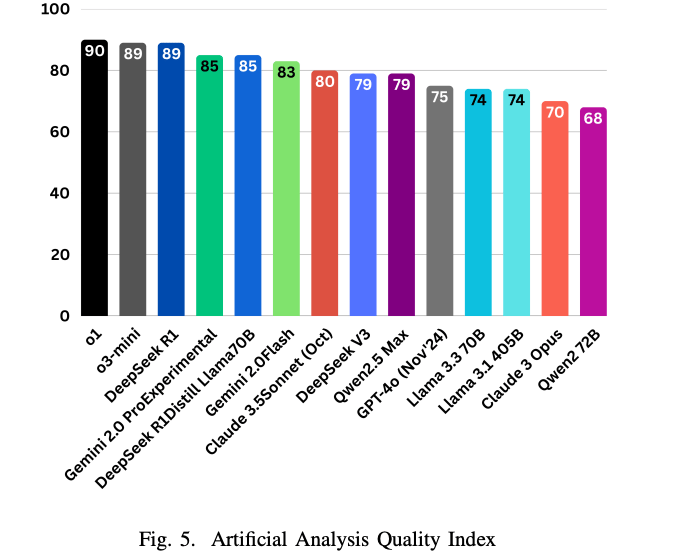

Figure 5 from "Comparative Analysis Based on DeepSeek, ChatGPT, and Google Gemini" University of Stony Brook (18)
Deep Seek's architecture has pioneered a Mixture of Experts approach, (19)(20). In this approach, when an input is entered and tokenized the input value triggers selective activation of model components to generate an answer. Selective model activation increases the efficiency and decreases the cost of using Deep Seek.
"DeepSeek employs a Mixture-of-Experts (MoE) approach, activating only the parameters most relevant to the task at hand, which makes it especially effective for domain-specific work. " (18)(19)(20)
"ChatGPT relies on a dense transformer model enhanced through reinforcement learning from human feedback (RLHF)" (18)
"[ChatGPT] values “rippling through” successive layers in a network" (21)
"[ChatGPT is ] running each prompt through the entire neural network each time" (22)
"Google Gemini actually uses a multimodal transformer architecture that integrates text, code, and images into a single framework." (18)
Finally looking at carbon foot print we will look at a few metrics below from a third-party French analysis (23).
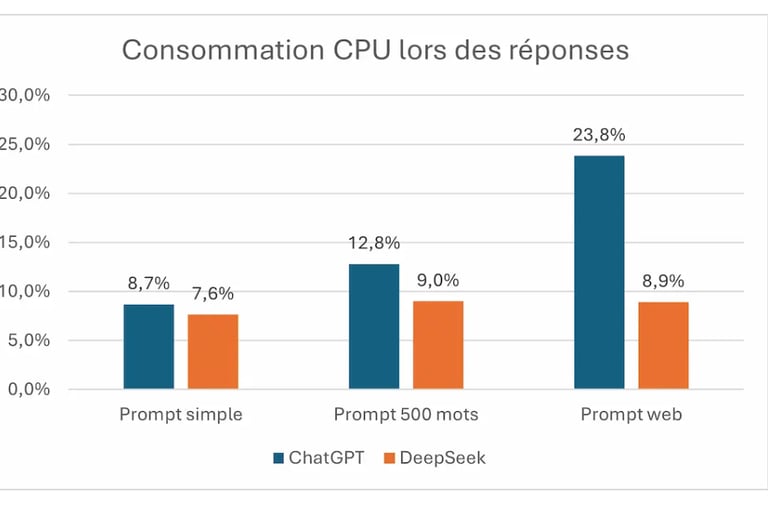

Discharge speed
First is CPU consumption during responses.
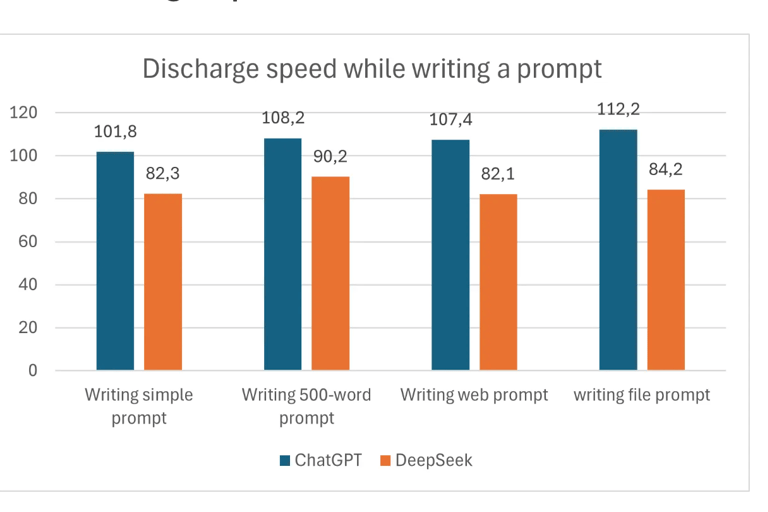

ChatGPT discharges the battery faster when writing a prompt. 102.37 µAh/s compared with 85.51 µAh/s for DeepSeek, figures taken from the single prompt. This trend holds true for all prompts. Given that writing prompts take the same amount of time for both, on average DeepSeek consumes 24% less than ChatGPT when writing prompts. (23)
Data transfer from application at rest
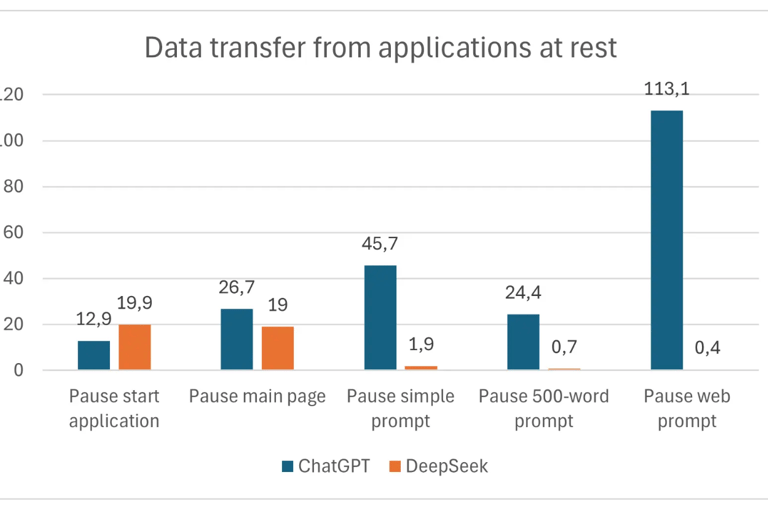

"For DeepSeek, launching the application requires more data than ChatGPT. However, once the application has been definitively launched, there are only small ‘reasonable’ data flows. DeepSeek therefore manages data flows better than ChatGPT." (23)
When looking at additional factors such as response time where ChatGPT leads and aggregating the data ChatGPT is on paper has a slight edge energy efficiency.
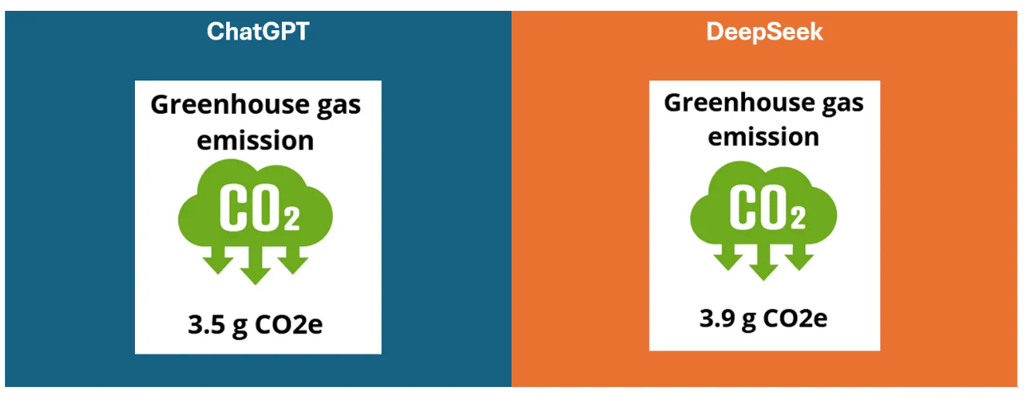

"Whether for ChatGPT or DeepSeek, the impact remains very high for just three responses, with an average of more than one gram of CO2 per response. This corresponds to a video lasting around 2 minutes for ChatGPT and 2 minutes 30 seconds for DeepSeek." "These measurements were carried out on: DeepSeek version 1.0.8 and ChatGPT version 1.2025.028." (23)
Factoring Gemini, in August 2025 (24)(25) Google published their own internal review on their energy consumption. "We estimate the median Gemini Apps text prompt uses 0.24 watt-hours (Wh) of energy, emits 0.03 grams of carbon dioxide equivalent (gCO2e), and consumes 0.26 milliliters (or about five drops) of water — figures that are substantially lower than many public estimates. The per-prompt energy impact is equivalent to watching TV for less than nine seconds. that the median energy consumed per prompt is 0.03 g CO2e." Respected University of Oxford researcher Hannah Ritchie writes "Even if people have critiques of the methodology, the fact that it’s laid out in some detail makes it possible to challenge more specifically. It’s impossible to properly engage when it’s just the CEO giving a number without any context."(26).
"Google’s new paper is very welcome, but it does exclude a few things"
"External networking. That is the energy used by your own internet service provider before it “gets to” Google. They don’t include this because it’s not within their control. But it’s also true that the energy use here is tiny compared to the energy used for compute. It would have negligible impact on the final numbers."
"End user devices. They don’t include energy used by your own hardware: computer, monitor, whatever you’re using."
"Training. I already mentioned this a few times. They are focused on the marginal energy used per AI prompt. They are not looking at the energy use of training." (26)
For now we will have to wait for more transparency and additional third-party verification of the data, but the data provided must be noted.
Now considering the Deep Seek vs ChatGPT, Deep Seek uses fewer NVIDIA chips, lower quality chips, focused on a computationally selective and efficient model architecture and still has results on par with ChatGPT and a lower cost to build and train (15) this is clear if you value the environment, energy consumption, and efficiency, then Deep Seek must be considered.
1.3 Data Responsibility
By now we are all familiar with the data practices of US technology companies, in this example we will use Google. Every time you log in to a Google service, there is a record of where you are logging in from. Personal information is also logged, for example your age and gender. When you search topics, those are recorded as well. This data is stored in Google owned servers. Legally and "on paper" Google does not sell your data what they do is monetizes your data. They sell advertisement space on you cellphone or laptop (27, 28). The whole process is a twist of language and technicality and users agree to it when you accept their terms. If you use Google services, your data is subject to US authorities through the CLOUD Act. The Cloud Act allows US authorities to demand personal data from Google, Facebook, Amazon and other US providers, even when they’re operating (or hosting that data) in another jurisdiction such as the EU (29, 30).
“A provider of electronic communication service or remote computing service shall comply with the obligations of this chapter to preserve, backup, or disclose the contents of a wire or electronic communication and any record or other information pertaining to a customer or subscriber within such provider’s possession, custody, or control, regardless of whether such communication, record, or other information is located within or outside of the United States”, Section 2713. Required preservation and disclosure of communications and records, CLOUD ACT (31)
In comparison, we will look at Deep Seek's policies. Deep Seek's terms and privacy (32, 33) state that they collect personal data, location, etc. just like Google. The terms for your use of Deep Seek are governed by the laws of the People's Republic of China in the mainland. Similarly, because of the CLOUD Act, a user can come under US jurisdiction. So far similar, the big difference here is that data sent when using Deep Seek is stored in servers in China, which factors into response times mentioned in the previous section.
There is a lot of manufactured fear that China could do bad things with your data. Let's look at the data and numbers. China has 1 known overseas naval base in Cambodia (34), 1 known logistics base in Djibouti (35) and 1 intelligence base in Cuba (36) (37) (38). The US has 128 bases around the world (39). Other reports place that number much higher (40) (41). If we consider nefarious state actors and the probability of actionable bad intent 128 chances is bigger than 3 chances. If we add each countries position, with respect to Gaza, we can observe more striking differences in data responsibility. Let's factor in Francesca Albanese widely circulated and accepted report and other sources (42, 43, 44) on how Google and OpenAI are employing their technology Eastern Mediterranean. These reports document the usage of cloud storage, A.I. technology and more to impose persecution and fear.
Bringing back to China, no country is perfect, yet China has been consistently on the side of Gaza and peace in the Middle East. In 2023 "President Xi Jinping stated China’s principled position on the current Palestinian-Israeli situation on a number of occasions. He stressed the need for an immediate ceasefire and ending the fighting, ensuring that the humanitarian corridors are safe and unimpeded, and preventing the expansion of the conflict." (45). In 2025 "China stands ready to work with the international community to play a constructive role in promoting a ceasefire, ending the fighting and deescalating the regional situation" (46). Based on the data there is clearly more worry in how the US backed A.I. will do with their technology.
Conclusion
TL,DR
Transparency: Deep Seek is the trend setter and has the edge.
Efficiency: ChatGPT has a slight edge over Deep Seek due to distance and response time. More third-party verification is needed from Gemini's most recent report.
Data Responsibility: Deep Seek has the edge because there is no evidence of user data monetization. Deep Seek makes money via AI-driven algorithms to analyze financial markets and execute trades and API access to its advanced AI models at competitive rates. (47). And China's pro-peace stance in the Middle East.
Lastly, an Australian think tank (48, 49) already calculates China leading the US in 57 out of 64 critical technologies. The world is changing and I assert that you change from a US based A.I. to Deep Seek. Thank you for you readership. Keep Developing!
Access Deep Seek here https://chat.deepseek.com/sign_in
Need an on-call strategist? Email info@averiguar.org for your questions and book a meeting.
Sources
(1) USC study reveals the key reason why fake news spreads on social media USC https://today.usc.edu/usc-study-reveals-the-key-reason-why-fake-news-spreads-on-social-media/
(2) “Google Gemma: because doesn’t want to give away Gemini yet”. The Verge. 21 February 2024. https://www.theverge.com/2024/2/21/24078610/google-gemma-gemini-small-ai-model-open-source
(3) "What does ChatGPT mean for the open source community?".Open Source. 18 February 2023 https://opensource.com/article/23/2/chatgpt-vs-community
(4) "Gemma: Introducing new state-of-the-art open models" Google. 21 February 2024. https://blog.google/technology/developers/gemma-open-models/
(5) :Run OpenAI's new GPT-OSS (open-source) model on Northflank". Northflank. 5 August 2025. https://northflank.com/blog/self-host-openai-gpt-oss-120b-open-source-chatgpt
(6)Deep Seek R-1 the Open Source A.I. changing the game in technology. Medium. 26 January 2025. https://medium.com/@soaltinuc/deepseek-r1-the-open-source-ai-changing-the-game-in-technology-15132b99b9d7
(7)"If You've Asked ChatGPT a Legal Question, You May Have Accidentally Doomed Yourself in Court". Futurism. https://futurism.com/chatgpt-legal-questions-court
(8) "After Backlash, ChatGPT Removes Option to Have Private Chats Indexed by Google". PC Mag. 01 August 2025 https://www.pcmag.com/news/be-careful-what-you-tell-chatgpt-your-chats-could-show-up-on-google-search
(9) 30 July 2025 Google is indexing ChatGPT conversations, potentially exposing sensitive user data. https://www.fastcompany.com/91376687/google-indexing-chatgpt-conversations
(10) Why Did Google Gemini “Leak” Chat Data? Search Engine Journal. 13 February 2024 https://www.searchenginejournal.com/google-gemini-leak/508126/
(11) "What are LLMs and generative AI? A beginner’s guide to the technology turning heads". University of Toronto. 25 January 2024 https://srinstitute.utoronto.ca/news/gen-ai-llms-explainer
(12) "Decoding Tokenization Strategies for Large Language Models (LLMs)". Medium. 30 October 2024 https://medium.com/@sahin.samia/decoding-tokenization-strategies-for-large-language-models-llms-ffc3fa51aff6
(13) "How Chinese A.I. Start-Up DeepSeek Is Competing With Silicon Valley Giants". New York Times. 23 January 2025. https://www.nytimes.com/2025/01/23/technology/deepseek-china-ai-chips.html
(14) "How much energy does ChatGPT use?". Epoch A.I. 07 February 2025. https://epoch.ai/gradient-updates/how-much-energy-does-chatgpt-use
(15) "China’s DeepSeek AI is hitting Nvidia where it hurtsDeepSeek’s AI models reportedly rival OpenAI’s for a fraction of the cost and compute." The Verge. 27 January 2025. https://www.theverge.com/2025/1/27/24352801/deepseek-ai-chatbot-chatgpt-ios-app-store
(16) "China's military and government acquire Nvidia chips despite US ban". Reuters. 15 January 2024 https://www.reuters.com/technology/chinas-military-government-acquire-nvidia-chips-despite-us-ban-2024-01-14/
(17)"Performance Comparison: NVIDIA A100, H100 & H800". Substack. 18 February 2024. https://ikigaitechnology.substack.com/p/performance-comparison-nvidia-a100-h100-h800-04db98c58648
(18) "Comparative Analysis Based on DeepSeek, ChatGPT, and Google Gemini: Features, Techniques, Performance, Future Prospects". University of Stony Brook, NY. 25 February 2025 https://arxiv.org/pdf/2503.04783v1
(19) "DeepSeekMoE: Towards Ultimate Expert Specialization in Mixture-of-Experts Language Models". Deep Seek. 11 January 2024. https://arxiv.org/pdf/2401.06066
(20) "DeepSeek-V3 Technical Report". Deep Seek. 27 December 2024. https://arxiv.org/pdf/2412.19437v1
(21) "What Is ChatGPT Doing … and Why Does It Work?". Stephan Wolfram. 14 February 2023. https://writings.stephenwolfram.com/2023/02/what-is-chatgpt-doing-and-why-does-it-work/
(22) "How does ChatGPT work? Here's the human-written answer for how ChatGPT works." Zapier. 18 November 2024. https://zapier.com/blog/how-does-chatgpt-work/
(23) "What is the environmental impact of LLM use on the customer’s side ? Battle ChatGPT VS DeepSeek" Greenspector. 24 March 2025. https://greenspector.com/en/what-is-the-environmental-impact-of-llm-use-on-the-customers-side-battle-chatgpt-vs-deepseek/
(24) "How much energy does Google’s AI use? We did the math".Google. 21 August 2025 https://cloud.google.com/blog/products/infrastructure/measuring-the-environmental-impact-of-ai-inference
(25) "Measuring the environmental impact of delivering AI at Google Scale".Cornell University. 21 August 2025 https://arxiv.org/pdf/2508.15734
(26) "What's the carbon footprint of using ChatGPT or Gemini? [August 2025 update]" Hannah Ritchie. Substack. https://www.sustainabilitybynumbers.com/p/ai-footprint-august-2025
(27) "Google Says It Doesn’t 'Sell' Your Data. Here’s How the Company Shares, Monetizes, and Exploits It." Electronic Frontier Foundation. 19 March 2020. https://www.eff.org/deeplinks/2020/03/google-says-it-doesnt-sell-your-data-heres-how-company-shares-monetizes-and
(28) "Behind the One-Way Mirror: A Deep Dive Into the Technology of Corporate Surveillance". Electronic Frontier Foundation. 02 December 2019. https://www.eff.org/wp/behind-the-one-way-mirror#Real-time-bidding
(29) "Is Google Analytics GDPR Compliant? Ensuring Google Analytics GDPR Compliance for Google Analytics 4". Secure Privacy. 31 May 2024 https://secureprivacy.ai/blog/google-analytics-4-gdpr-compliance
(30) "Is Google Analytics illegal? Several European Data Protection Authorities say so". Plausible.io. 06 July 2023 https://plausible.io/blog/google-analytics-illegal
(31) H.R.4943 - CLOUD ACT. United States Congress. 06 February 2018. https://www.congress.gov/bill/115th-congress/house-bill/4943/text
(32) "Deep Seek Terms of Use". Deep Seek. 28 April 2025. https://cdn.deepseek.com/policies/en-US/deepseek-terms-of-use.html
(33) "Deep Seek Privacy Policy" Deep Seek. 4 July 2025. https://cdn.deepseek.com/policies/en-US/deepseek-privacy-policy.html
(34) A Tale of Two Reams: Questions Remain at Cambodia’s Growing Naval Base. Center for Strategic and international Studies. 05 May 2025. https://amti.csis.org/a-tale-of-two-reams-questions-remain-at-cambodias-growing-naval-base/
(35) "China Reaches Deal To Build Military Outpost In Djibouti". NPR. 21 January 2016 https://www.npr.org/sections/thetwo-way/2016/01/21/463829799/china-reaches-deal-to-build-military-outpost-in-djibouti
(36) "Cuba to host a Chinese spy base focusing on U.S., 'Wall Street Journal' reports." NPR. 21 June 2023. https://www.npr.org/2023/06/21/1183408469/cuba-to-host-a-chinese-spy-base-focusing-on-u-s-wall-street-journal-reports
(37) China’s Intelligence Footprint in Cuba: New Evidence and Implications for U.S. Security" Center for strategic and international studies. 6 December 2024. https://www.csis.org/analysis/chinas-intelligence-footprint-cuba-new-evidence-and-implications-us-security
(38) ANNUAL THREAT ASSESSMENT OF THE U.S. INTELLIGENCE COMMUNITY. Office of the Director of National Intelligence. 05 February 2024. https://www.odni.gov/files/ODNI/documents/assessments/ATA-2024-Unclassified-Report.pdf
(39) "U.S. Overseas Basing: Background and Issues for Congress" US Congressional Research Service 10 July 2024 https://sgp.fas.org/crs/natsec/R48123.pdf
(40) "Infographic: US military presence around the world" Al Jazeera 10 September 2021. https://www.aljazeera.com/news/2021/9/10/infographic-us-military-presence-around-the-world-interactive
(41) "Where in the World Are U.S. and China’s Militaries?"Newsweek. 07 August 2024 https://www.newsweek.com/america-china-world-military-site-map-overseas-bases-1934478
(42) "From economy of occupation to economy of genocide" UN Human Rights Council. 30 June 2025. https://www.ohchr.org/sites/default/files/documents/hrbodies/hrcouncil/sessions-regular/session59/advance-version/a-hrc-59-23-aev.pdf
(43) "UN Calls Out Google and Amazon for Abetting Gaza Genocide". Progressive International. 26.August 2025. https://progressive.international/wire/2025-08-26-un-calls-out-google-and-amazon-for-abetting-gaza-genocide/en
(44) "Google, Amazon, & Microsoft allegedly complicit in war crimes amid Israel's war in Gaza". Business and Human Rights Resource Centre. 02 April 2025. https://www.business-humanrights.org/en/latest-news/google-amazon-microsoft-allegedly-complicit-in-war-crimes-amid-israels-war-in-gaza/
(45)"Position paper of the People’s Republic of China on resolving the Palestinian-Israeli conflict – Letter from China". United Nations. 15 December 2023. https://www.un.org/unispal/document/china-postions-paper-palestineisrael/
(46) "China condemns Israeli attack in Qatar, calls for deescalation" CGTN. 17 September 2025. https://news.cgtn.com/news/2025-09-17/China-condemns-Israeli-attack-in-Qatar-calls-for-deescalation-1GJAqgKOAUg/p.html
(47) "Deepseek Business Model". Business Model Analyst. 31 January 2025. https://businessmodelanalyst.com/deepseek-business-model/#How_DeepSeek_makes_money
(48) "ASPI’s two-decade Critical Technology Tracker: The rewards of long-term research investment". Australian Strategic Policy Institute. 28 August 2024. https://www.aspi.org.au/report/aspis-two-decade-critical-technology-tracker/
(49) "China now leads 90pc of critical tech research. US losing its advantage, Australian think tank says." Information Age. 03 September 2024. https://ia.acs.org.au/article/2024/china-now-leads-90pc-of-critical-tech-research.html
Aprendizaje
Plataforma global de aprendizaje multilingüe y estratégico.
Coaching
Ebooks
info@averiguar.org
© 2025. Terms and Services
© 2025. All rights reserved.
© 2025. Privacy Policy
© 2025. Refund Policy